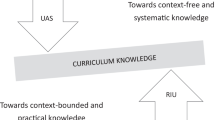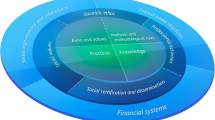Abstract
The theoretical inquiry undertaken in this paper examines the discourse of knowledge equivalence used to justify conflating academic and non-academic subjects in New Zealand secondary school science. The purpose is to open up a critical discussion of the discourse and its influence on curriculum and pedagogy. Using a conceptual methodology, we identify the differences between academic and non-academic subjects to argue that there are sound epistemological and equity reasons not to combine academic and non-academic subjects into innovated pathways. A research study which explored the curriculum practices of several senior science teachers is used to illustrate our theoretically derived analysis and explanation of the knowledge equivalence discourse.
Similar content being viewed by others
References
Bailey, C. (1984). Beyond the present and the particular: A theory of liberal education. London: Routledge & Kegan Paul.
Barrett, B., & Rata, E. (2014). Knowledge and the future of the curriculum: International studies in social realism. Basingstoke: Palgrave Macmillan.
Beck, J., & Young, M. F. (2005). The assault on the professions and the restructuring of academic and professional identities: A Bernsteinian analysis. British Journal of Sociology of Education, 26(2), 183–197.
Benade, L. (2014). Knowledge and educational research in the context of “Twenty-first century learning”. European Educational Research Journal, 13(3), 338–349.
Bernstein, B. (2000). Pedagogy, symbolic control and identity: Theory, research, critique (Rev. ed). Lanham, MD: Rowan and Littlefield.
Bishop, R. (2012). Achievements, orthodoxies and science in Kaupapa Maori schooling. New Zealand Journal of Educational Studies, 47(2), 51–62.
Bolstad, R. (2012). Principles for a future-oriented education system. New Zealand Review of Education, 21, 77–95.
Bourdieu, P. (2004). Science of science and reflexivity. Cambridge: Polity Press.
Department of Education. (2013). Reforming the accountability system for secondary schools. https://www.gov.uk/government/consultations/secondary-school-accountability-consultation.
Durkheim, E. (2001). The elementary forms of religious life. New York, NY: The Free Press.
Ferral, H. (2005). Clustering students by their subject choices in the Learning Curves Project. Wellington: NZCER.
Hipkins, R. (2007). Course innovation in the senior secondary curriculum: a snapshot taken in July 2007. Wellington: NZCER.
Hipkins, R. (2013). NCEA one decade on. Views and experiences from 2012 National Survey of Secondary Schools. Wellington: Ministry of Education.
Hipkins, R., & Vaughan, K. (2012). Shaping our futures: meeting secondary students’ learning needs in a time of evolving qualifications: final report of the learning curves project. Wellington: New Zealand Centre for Education Research.
Hipkins, R., Vaughan, K., Beals, F., & Ferral, H. (2004). Learning curves; meeting student learning needs in an evolving qualifications regime. Wellington: NZCER.
Hipkins, R., Vaughan, K., Beals, F., Ferral, H., & Gardiner, B. (2005). Shaping our futures: meeting secondary students’ learning needs in a time of evolving qualifications. (Final report of the Learning Curves project, 2005). Wellington: Ministry of Education.
Hoadley, U., & Muller, J. (2009). Codes pedagogy and knowledge. In The Routledge (Ed.), International handbook of the sociology of education (pp. 69–78). Abingdon: Routledge.
Jensen, S., McKinley, E., & Madjar, I. (2010). NCEA subject choices in mid-low decile schools: “What schools and parents need to know about the university pathway”. Research Information for Teachers, 2, 37–43.
Kandel, E. (2006). In search of memory: The emergence of a new science of mind. New York: W. W. Norton & Company.
Maton, K., & Moore, R. (Eds.). (2010). Social realism, knowledge and the sociology of education: Coalitions of the mind. London: Continuum.
McPhail, G. (2012). Mixed pedagogic modalities: The potential for increased student engagement and success. New Zealand Journal of Educational Studies, 48(1), 113–126.
McPhail, G. (in press). The fault lines of recontextualisation: The limits of constructivism. British Educational Research Journal. doi:10.1002/berj.3199.
Ministry of Education. (2007). The New Zealand Curriculum for English-medium teaching and learning in years 1–13. Wellington: Learning Media.
Ministry of Education. (2014). Focus on priority learners. http://www.minedu.govt.nz/theMinistry/EducationInitiatives/InvestingInEducationalSuccess/Report/Part2/FoundationElements/Focus.aspx.
Moore, R. (2007). Sociology of knowledge and education. London: Continuum.
Morais, A. M., & Neves, I. P. (2011). Educational texts and contexts that work. In D. Frandji & P. Vitale (Eds.), Knowledge, pedagogy and society (pp. 191–211). London: Routledge.
Muller, J. (2000). Reclaiming knowledge: Social theory, curriculum and education policy. London: Routledge Falmer.
Nola, R. (2001). Review of Michael Matthews, time for science education. Educational Philosophy and Theory, 33(3&4), 427–430.
New Zealand Qualifications Authority. (2014). Standards. http://www.nzqa.govt.nz/qualifications-standards/qualifications/ncea/understanding-ncea/how-ncea-works/standards/.
Phillips, D. (2010). Curriculum and assessment policy in New Zealand: Ten years of reforms. Educational Review, 52(2), 143–153.
Pilcher, E., & Philips, D. (2007). Changing courses: A study of the responsiveness of schools to the National Qualifications Framework. New Zealand Annual Review of Education, 16, 151–171.
Popper, K. (1978). The Tanner lecture on human values, Three worlds, presented at The University of Michigan. http://tannerlectures.utah.edu/_documents/a-to-z/p/popper80.pdf.
Rata, E. (2012). The politics of knowledge in education. London, UK: Routledge.
Rata, E. (2015). A pedagogy of conceptual progression and the case for academic knowledge. British Educational Research Journal.doi:10.1002/berj.3195. First published 19 June.
Riley, B. (2014). Science, data and decisions in New Zealand’s education system. Wellington: Fulbright New Zealand.
Taylor, A. L. (2014). Students’ search for identity as credit hunters or science students. Unpublished master’s dissertation, The University of Auckland, New Zealand.
Vaughan, K. (2003). Changing lanes: Young people making sense of pathways. New Zealand Council for Educational Research Annual Conference: Educating for the 21st century (pp. 1–12). Wellington, NZ: NZCER.
Vygotsky, L. S. (1962). Thought and language (E. Hanfmann & G. Vakar Eds. & Trans.). Cambridge, MA: The MIT Press.
Wheelahan, L. (2010). Why knowledge matters in the curriculum: A social realist argument. New York: Routledge.
Winch, C. (2013). Curriculum design and epistemic ascent. Journal of Philosophy of Education, 47(1), 128–146.
Young, M. (2008). Bringing knowledge Back In: From social constructivism to social realism in the sociology of education. London, UK: Routledge.
Young, M., & Muller, J. (2010). Three educational scenarios for the future: lessons from the sociology of knowledge. European Journal of Education, 45(1), 11–27.
Young, M., & Muller, J. (2013). On the powers of powerful knowledge. Review of Education, 1(3), 229–250.
Author information
Authors and Affiliations
Corresponding author
Rights and permissions
About this article
Cite this article
Rata, E., Taylor, A. Knowledge Equivalence Discourse in New Zealand Secondary School Science. NZ J Educ Stud 50, 223–238 (2015). https://doi.org/10.1007/s40841-015-0020-1
Received:
Accepted:
Published:
Issue Date:
DOI: https://doi.org/10.1007/s40841-015-0020-1




